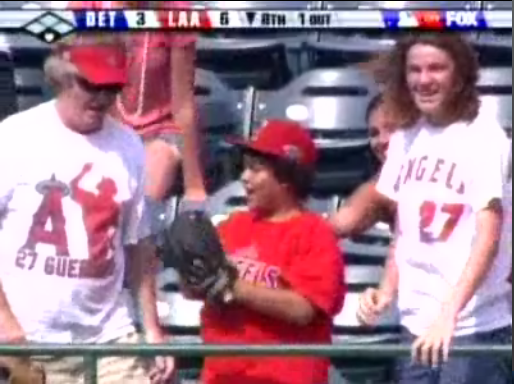Saturday, July 28, 2007 |
Anderson Owes That Kid: Angels 10, Tigers 3
No interference shall be allowed when a fielder reaches over a fence, railing, rope or into a stand to catch a ball. He does so at his own risk. However, should a spectator reach out on the playing field side of such fence, railing or rope, and plainly prevent the fielder from catching the ball, then the batsman should be called out for the spectator’s interference. Example: Runner on third base, one out and a batter hits a fly ball deep to the outfield (fair or foul). Spectator clearly interferes with the outfielder attempting to catch the fly ball. Umpire calls the batter out for spectator interference. Ball is dead at the time of the call. Umpire decides that because of the distance the ball was hit, the runner on third base would have scored after the catch if the fielder had caught the ball which was interfered with, therefore, the runner is permitted to score. This might not be the case if such fly ball was interfered with a short distance from home plate.However, since the hit was so high into the terrace level that there was no hope for the fielders to do anything other than wait for it to come down, the call for spectator interference seems to my biased eye to be somewhat suspect, and the umpires made the correct ruling. (Note that Wikipedia cites Jeffrey Maier's catch of a long flyball in Game 1 of the 1996 ALCS as a possible counterexample.)
Regardless, that wasn't the last of the Angels' scoring; given the recent travails of the Tigers' bullpen, we may assume the Angels haven't found their bats so much as the Tigers' bullpen ain't all that. (Incidental but significant applause also needs go to Orlando Cabrera, who got one into the bullpen; two homers in one game seems a huge extravagance.) But if the Halos get something from this game besides a questionable home run from Garret Anderson, it was the 3-for-4 night out of Jeff Mathis, who desperately needed it. The sudden offensive outburst brought him up to the Mendoza line, a welcome sign for those of us underwhelmed by his offense at Salt Lake.
It almost certainly bought him a measure of playing time over Ryan Budde than he already would have had. Budde got the callup from Salt Lake, surprisingly over Bobby Wilson, who was already on the 40-man. On the other hand, Wilson has barely played at AAA, whereas Budde is in his fourth season at AAA.
To the pitching end of things, Joe Saunders negotiated with the fearsome Tigers lineup (and three years ago, who would have thought I might say something like that?) with some aplomb and workman-like performances, giving up three runs over five and a third, two outs from a quality start. Given the opposition, it's a fine outing even though he finished the day with a no-decision. More, it's impressive that the Angels have taken a series from a postseason contender considering how badly they've played this month. Slumps and injuries there be, but glory, too, lies just around around the corner.
Update:

Update 2:
His name is Luis Castillo. Kid, the Angels' outfield is a bit crowded right now. D'ya think you could learn how to pitch in short relief?
Labels: angels, recaps, tigers
So, the correct call would have been ground rule double, in all probability, as the comment explains that in the case of intentional interference by a fan, the situation shall be dealt with as intentional interference as in Rule 3.15. Batter and runners shall be placed where in the umpire’s judgment they would have been had the interference not occurred.
I suspect that the umpires would have concluded that a ball off the scoreboard would have been a double. Interestingly, they could have allowed both runners to score if, in their judgment, they would have made it home, whereas on a ground rule double, runners advance only two bases.
So save for a tiny SLG boost, GA doesn't inherit much from Colonino's scoop, and likely owes him little more than a wink and a nod.
That's my story, and I'm sticking to it.
Newer› ‹Older


Post a Comment
Note: Only a member of this blog may post a comment.